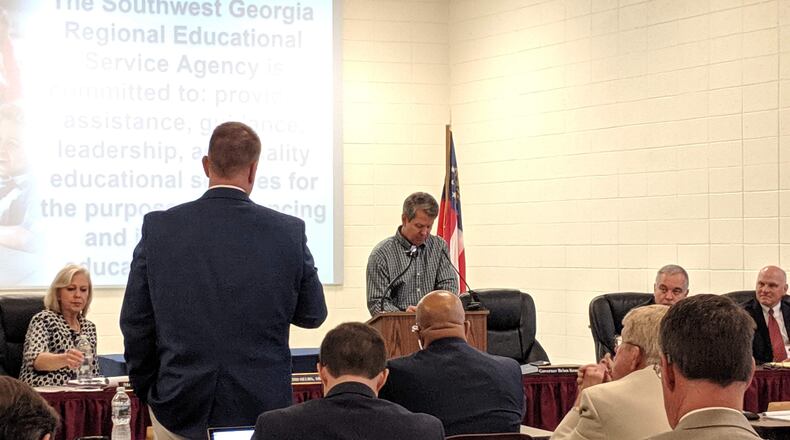An office that has been expanding under prior Georgia governors is shrinking under Brian Kemp, and may have a new mission.
The Governor’s Office of Student Achievement, established nearly two decades ago as the Office of Education Accountability, gained notoriety for its investigation of the Atlanta Public Schools cheating scandal in the late 2000s under Gov. Sonny Perdue. Its budget expanded under Perdue’s successor, Nathan Deal.
Gov. Kemp says he welcomes a reduced role, and a smaller budget. During a recent trip through south Georgia, he noted that lawmakers had cut the agency’s budget, adding, “normally a governor would get mad about that. We did not because I support taking away the duplication of services” with state school Superintendent Woods, who runs the Georgia Department of Education.
“I believe that we don’t need to have you all sitting in a meeting where they’re both giving the same report. That’s two different agencies talking about the same issues. And I’ve heard that a lot,” said Kemp, who was talking to education officials and lawmakers in Camilla last month.
Deal had a rocky relationship with Woods. In 2017, they openly sparred over control of a new school "turnaround" office lawmakers were creating. Woods wanted the turnaround chief reporting to him, but Deal wanted the office under the state school board he appoints. Deal knocked Woods in writing about the growing number of "chronically failing" schools, asking what the superintendent had done "to reverse this downward spiral of failure?" Woods responded that he'd been held back by "budgetary constraints" under the budget written by the governor and the legislature. Later that year, Deal refused to sign Woods' plan to comply with new federal education law, writing that it "falls short in setting high expectations."
Deal had wanted testing to weigh more heavily in school report cards. Meanwhile, GOSA, under Deal, developed its own school report cards, in what some saw as a duplication of the superintendent's more complicated College and Career Ready Performance Index.
With the election of Kemp, the relationship between superintendent and governor appears more cordial.
“I think the legislators would tell you that the interaction that we’re having with the superintendent’s office, that they’re having with the Governor’s Office of Student Achievement, has been just fantastic,” Kemp said. “We’re all talking, we’re all communicating. We all want to be on the same page.”
GOSA’s budget grew under Deal, but this year lawmakers cut it by a third, from about $25 million to less than $17 million. Rep. Terry England, R-Auburn, the House Appropriations Committee chairman, said there were “quite a few pennies sitting over there at GOSA that weren’t being used anymore.”
Some of it was shifted to Woods’ office, including $600,000 to pay for a new mandate to train computer science teachers and $1 million for more counselors and counseling services.
Kemp said he tasked his new GOSA leader, Joy Hawkins, with narrowing the agency’s mission to “do away with duplicative things that we have going on that the superintendent’s office is doing.” Kemp also wants GOSA focused on a new task: “helping with the literacy rate in our state.”
About the Author
Keep Reading
The Latest
Featured



